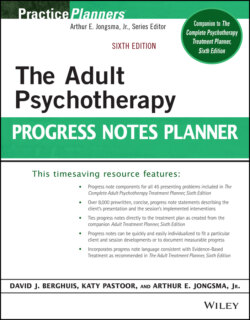Читать книгу The Adult Psychotherapy Progress Notes Planner - Berghuis David J., Arthur E. Jongsma Jr., David J. Berghuis - Страница 19
ATTENTION DEFICIT DISORDER (ADHD)—ADULT CLIENT PRESENTATION
Оглавление1 ADHD Childhood History (1)1The client confirmed that his/her/their childhood history consisted of the following symptoms: behavioral problems at school, impulsivity, temper outbursts, and lack of concentration.The client had a diagnosed ADHD condition in his/her/their childhood.Although the client's symptoms were not diagnosed as ADHD, it can be concluded from the childhood symptoms that the ADHD condition was present at that time.
2 Lack of Attention to Detail (2)The client reported failure to give close attention to detail or making mistakes with things of low interest, even though they may be important to his/her/their life.The client's lack of ability to give close attention has resulted in his/her/their missing out on the comprehension of important details.The client's ability to give close attention seems to be increasing as he/she/they reported increased attention skills.
3 Fidgety (3)The client reported that he/she/they cannot sit still for any length of time, but often feel restless and fidgety.The client gave evidence of being restless and fidgety within the session, often moving about in his/her/their chair.The client's ability to rest comfortably for a longer period of time has increased.
4 Difficulty Sustaining Attention (4)The client reported that he/she/they have difficulty sustaining attention to tasks or activities.The client gave evidence of difficulty sustaining attention within today's session.The client's difficulty sustaining attention is diminishing and his/her/their focused concentration is increasing.
5 Fails to Listen (5)The client does not seem to listen to others even when spoken to directly.The client reports problems with day-to-day functioning due to failure to listen to others.The client reports greater control over his/her listening when others are speaking to him/her/them.
6 Restless (6)The client reported that he/she/they cannot sit still for a significant length of time and often feels restless.The client gave evidence of being restless within the session, often moving about in his/her/their chair.The client's ability to rest comfortably for a longer period of time has increased.
7 Lack of Follow-Through (7)The client reported that he/she/they struggle to follow through on instructions and fail to finish duties.Family members reported frustration at the client's pattern of failing to finish duties.The client has shown progress in follow-through and completing duties.
8 Inability to Engage Quietly (8)The client reports an inability to engage in leisure activities quietly.The client has identified problems with others due to inability to engage in leisure activities quietly.The client has improved in his/her ability to engage in leisure activities at an appropriate noise level.
9 Disorganization (9)The client has a history of disorganization in many areas of his/her/their life.The client's disorganization is evident in areas related to home and work, leading him/her to be less efficient and less effective than he/she/they could be.The client has made significant progress in increasing his/her/their organization and is using that organization to become more efficient.The client uses lists and reminders to increase his/her organizational ability.
10 On the Go (10)The client is often described as “on the go” or acting as if “driven by a motor.”The client has identified problems with overall functioning due to his/her/their “on the go” behaviors.The client has been able to improve in functioning as he/she/they have reduced their “on the go” behaviors.
11 Avoidance (11)The client often avoids, dislikes, or is reluctant to engage in tasks that require sustained mental effort.The client has struggled to maintain employment or struggles in school due to his/her/their avoidance of tasks that require sustained mental effort.The client has reduced their avoidance of difficult tasks and reports improved functioning in a variety of areas.
12 Excessive Talking (12)The client talks excessively.The client's family and friends have reported frustrations due to excessive talking.The client has improved in his/her/their ability to talk an appropriate amount.
13 Losing Items (13)The client often loses items necessary for tasks or activities.The client identified problematic functioning due to losing items necessary for his/her/their day-to-day tasks.The client has managed self better in order to reduce loss of necessary items.
14 Interrupting (14)The client often interrupts, doesn't wait for his/her/their turn, or blurts out answers before a question has been completed.The client's friends and family have identified problems related to the client's inability to function appropriately in social situations.The client's work relationships have suffered due to an inability to function appropriately.The client has reduced the need to interrupt others, now waits for others, blurts out answers less, and has identified positive results from this improvement.
15 Distractibility (15)The client reported that he/she/they are easily distracted and his/her/their attention is drawn away from the task at hand.The client gave evidence of distractibility within today's session.The client's distractibility is diminishing and his/her focused concentration is increasing.
16 Forgetful (16)The client identified often being forgetful in daily activities.The client's day-to-day functioning has suffered due to his/her/their forgetfulness.The client has identified ways to be less forgetful and identified positive experiences.
